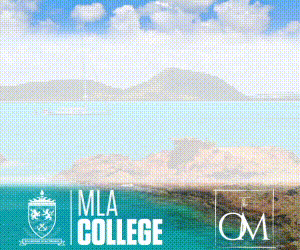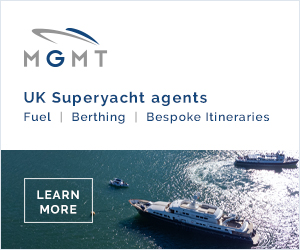WHERE DO YOU STUDY?
How do Superyacht crew/MLA College students manage to study for a maritime sustainability degree and balance their working life in the industry?
Earlier this year we looked at a Q&A session with MLA College student Richard, who managed to fit his BSc coursework in by putting in an hour before work each morning during a very busy season. We thought this was worth exploring further – Emma Baggett has tracked down some of the other Superyacht crew/MLA College Students currently enrolled on the MSc and BSc Sustainable Maritime Operations (SMO) courses and asked how they approach the tricky dilemma of balancing work, play, and studying a degree-level program, and what was their motivation to enroll on the program?
Matt: Chief Officer
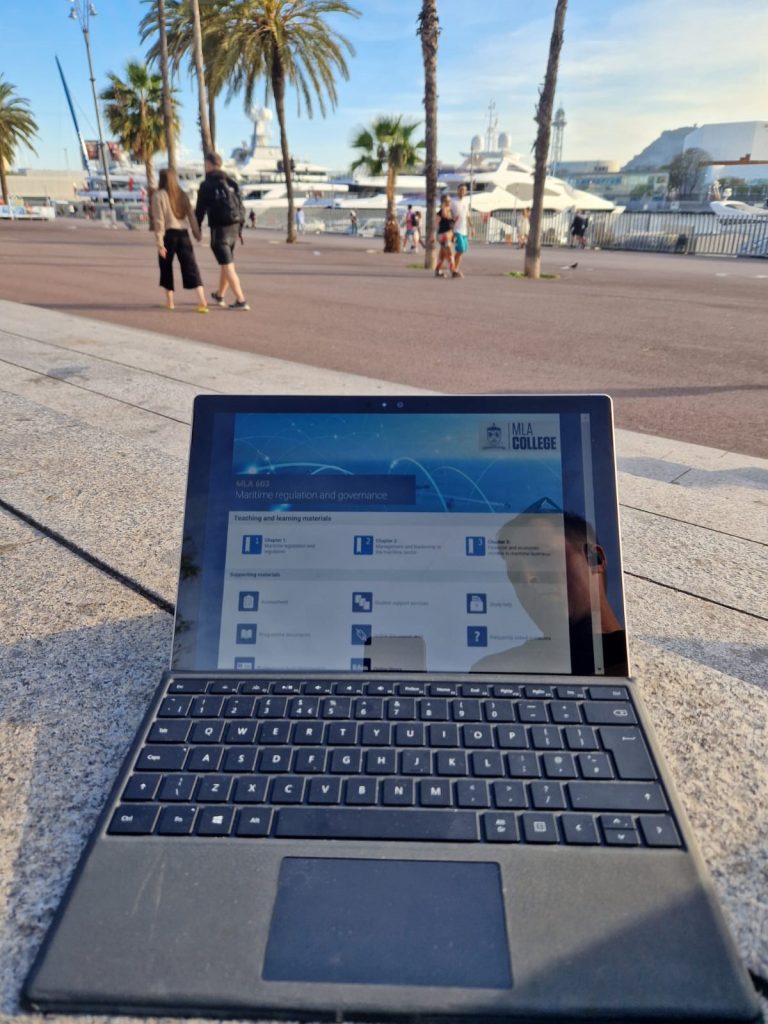
My approach to studying whilst working on a busy vessel has been to employ the idea of using good organisation, and studying little and often – this hasn’t always gone to plan, though. My advice for anyone thinking of doing this course is don’t do what I did and start the BSc in the middle of a busy charter season. I was completing my first piece of coursework over five pretty intense days on charter, getting very little sleep!
I gained a foundation degree through my yacht cadetship and passed my Officer of the Watch 3000GT exam, something which required a lot of focus. For around two years, I was either at work or maritime college doing my modules, only seeing my family and friends in the scraps of time I had left. While it was a major commitment, putting all my effort into my studies led to passing everything the first time. Additionally, all the knowledge I’ve gained has become quite firmly lodged in my brain, giving me real confidence in my ability.
When I passed the exam, after the initial 15 minutes of absolute joy, I was hit, quite firmly, with the simple question of “now what?” This leads quite neatly to why I applied for the BSc Hons in Sustainable Maritime Operations with MLA College, the course which has given me options for a career after working at sea. I have decided to not pursue any higher qualification beyond my current Chief Mate 3000 CoC as I really enjoy the role of Chief Officer, in the long term I want to get a shore-based job, especially if I ever have a family. I’m also lucky enough to be in a position where I can find extra time to learn about things that interest me and focus on my personal development. I believe this is one of the greatest advantages of this course. My professional seafaring career has been a mixture of hard work, sheer effort and commitment, right-time right-place, and a lot of luck. When I first started, you had to walk up and down docks all over the Riviera handing out CVs and “dock walking”. I have come a long way since then and I see this next phase of the study as my next big challenge. It’s hard work but the advantages it brings to me personally make it worth it.
Archie: Chief Officer
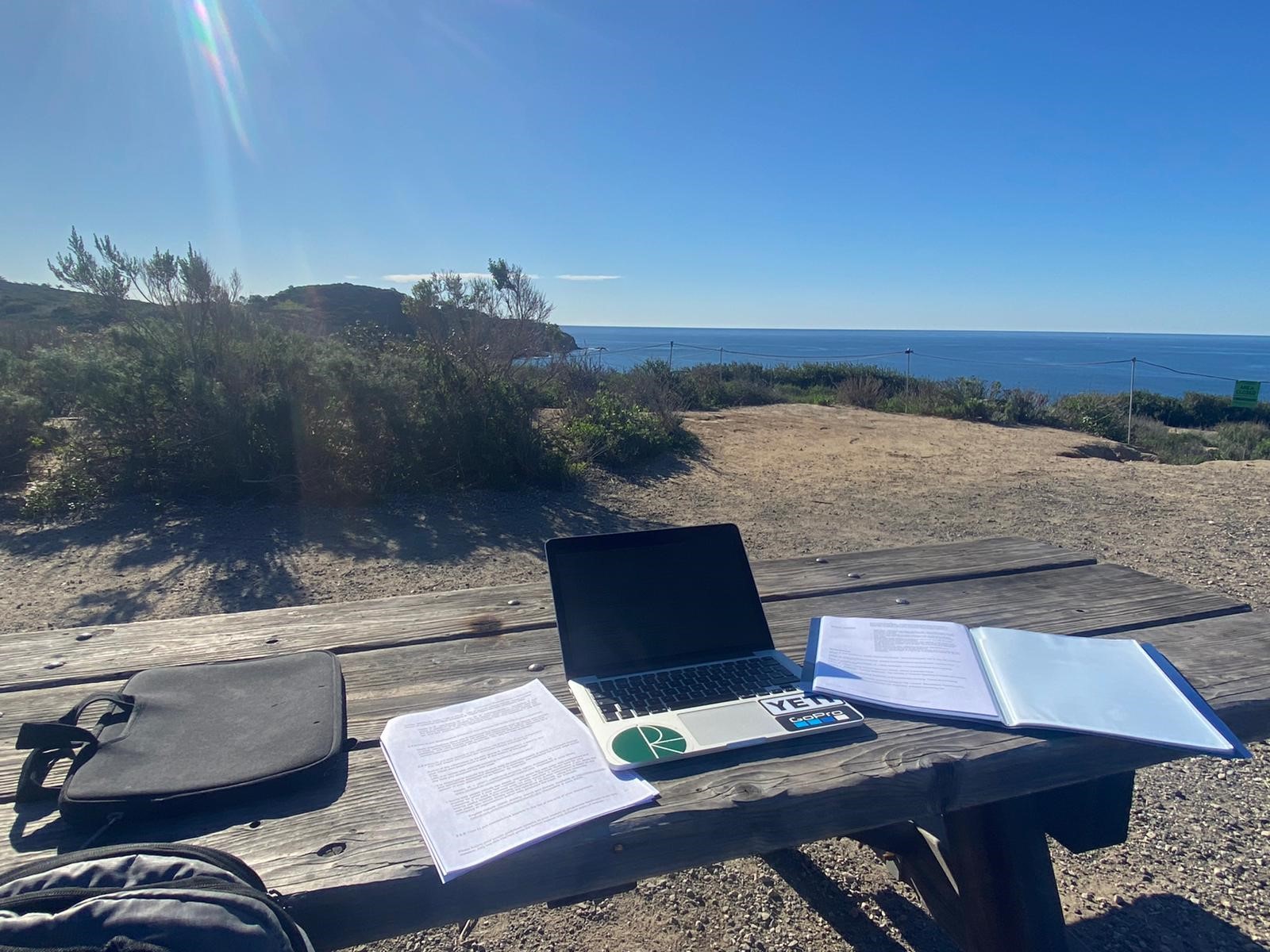
I started the BSc SMO in January this year, and for me, the distance learning format could not be better, I love the idea of being able to work remotely, and in this new post-COVID19 world that we are living in, I expect it will become the new norm. The freedom of movement and being able to complete this degree from wherever work takes me is a huge draw. In terms of balancing my workloads, I am not too concerned. I have become well-practiced at utilising my valuable free time. Having spent the last 5 years working on dual season charter motor yachts in high-pressure environments, this has shaped how I operate in not just my professional life but also in my personal life.
However, what happens when I am ready to hang up the epaulettes and return to a shore-based life? How will I provide for my family when I reach an age where that is expected of me? The ocean has become my home away from home, and the environment and its preservation is something I feel extremely passionate about. Therefore, continuing my study into maritime sustainability makes a lot of sense to me. My practical experience gives me valuable insight into the sector and now allows me the opportunity to further my knowledge. I have seen first-hand the negative impacts that come with these big boats on this delicate ecosystem, I have a genuine desire to do my part to rectify this. After all, there is no maritime industry without a healthy thriving marine environment. For us preservation is everything.
Going forward, I am excited to complete the BSc program with MLA College, I know that I have a lot more travel in-store… many more interesting people and experiences. One day when I hang up my mop, I believe that the skills and qualities I have gained from my service so far will transfer well into the shore-based corporate structure, and I have learned that I am a pretty adaptable and will turn my hand to whatever opportunity comes my way.
Mick: Chief Engineer
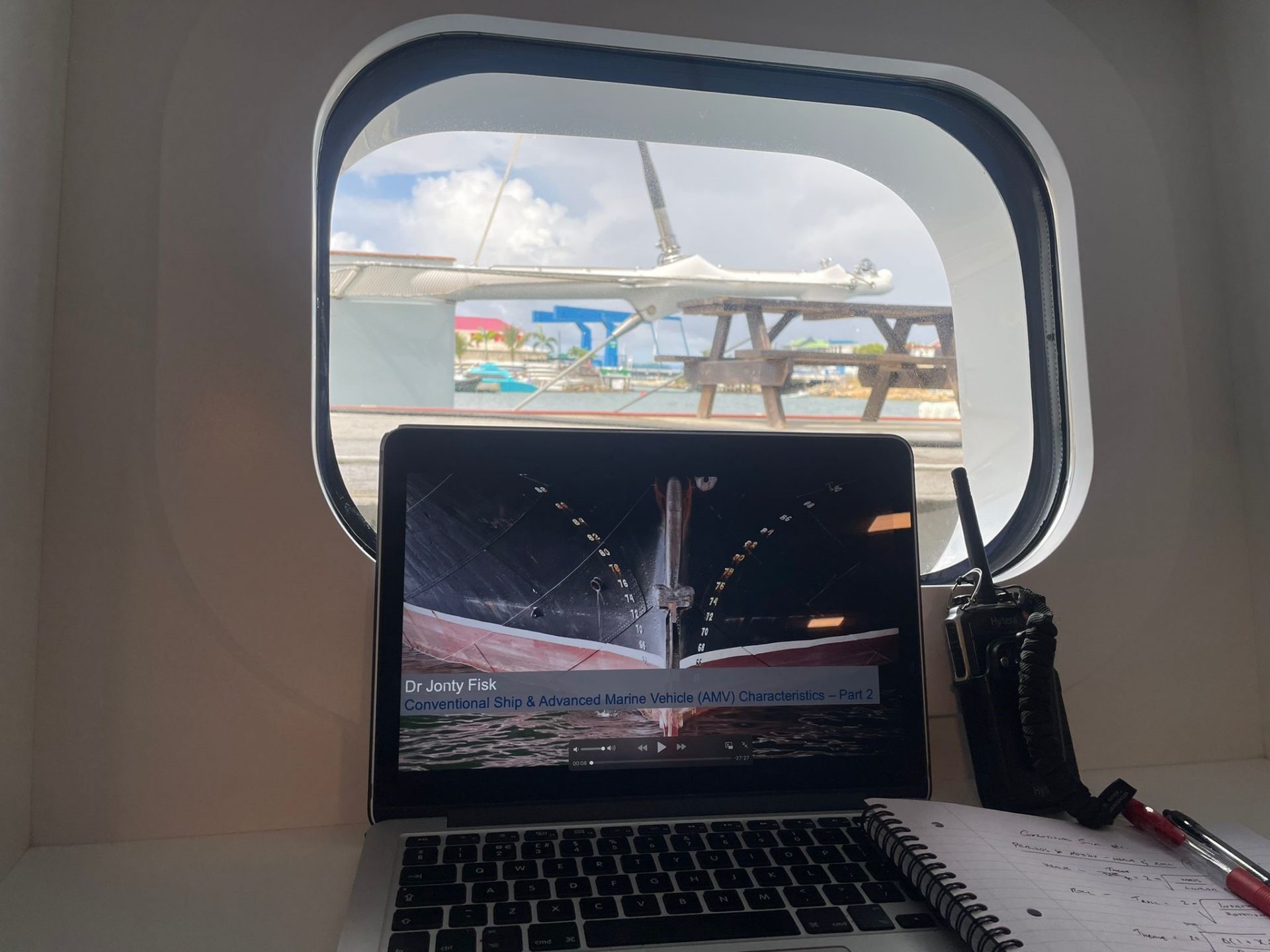 I started studying for my MSc in January 2022, balancing my study with a rotational chief engineer’s role and a busy family life. In practice, this means putting in a lot of late nights and early mornings in order to complete module assignments, times where I can work uninterrupted and keep my focus.
I started studying for my MSc in January 2022, balancing my study with a rotational chief engineer’s role and a busy family life. In practice, this means putting in a lot of late nights and early mornings in order to complete module assignments, times where I can work uninterrupted and keep my focus.
I find it important to maintain two values: the first is balance and the second is patience. Social life, family life, rest, and exercise are extremely important parts of a fulfilling life; human needs must be balanced with college workload – spending time to reduce stress helps maintain focus. Patience is necessary because I have found it necessary to read volumes of research papers just to get a few sentences. It can be necessary to write, delete and write again many times to make a point and keep to a word count. It’s daunting and frustrating at first but ultimately rewarding.
I feel that the MSc syllabus aligns strongly with my career arc, particularly as I commence the Project and Data Management module. I aim to continue my seagoing career as chief engineer for now, while also focusing on building skills for an eventual transition to shore-based employment. Studying at this level supports these aims and has been an ambition of mine for a long time. I have become increasingly interested in sustainability in recent years, particularly since becoming a chief engineer.
Working towards sustainable goals is an important part of my role onboard, it’s something that has value to the community as well as my employer. I know that building experience and knowledge in this field will allow me to develop my career in interesting and fulfilling ways.
To read my most recent piece on Sustainability and STCWs for engineers, Click here.
Sam: Delivery and Yard Captain

After 10 years of working full-time onboard sailing yachts with very little time out, I decided to expand my knowledge of the marine industry as a whole. The inbuilt flexibility of the Sustainable Maritime Operations BSc program has allowed me to juggle working, studying this course, and pursuing my MCA qualifications alongside some personal time out. I hope that the broader appreciation of all marine sectors helps me not only make more informed decisions onboard my current vessel but also move forward in my long-term career, wherever that might take me.
I have been incredibly fortunate to work on a variety of sailing vessels throughout my career, growing skills in management and leadership, navigation and seamanship, fund, and time allocation, all whilst working up the hierarchal ladder. Finding solutions for many and varied obstacles in different geographic areas, whilst meeting the requirements of high-net-worth individuals, their families, and friends requires a positive and resourceful outlook. Currently, I am the chief officer and delivery captain onboard a dual-season performance yacht.
In the last couple of years, I have overseen two multi-million-euro refits and completed two successful Atlantic crossings. This growth in position and responsibility has been challenging but also extremely rewarding. The management of crew, who are from diverse cultures, have various levels of knowledge and experience, who have different aspirations, and who all need continuing support physically, mentally, medically, and encouragement to achieve is something I enjoy. The process of planning, budgeting, monitoring, updating, and keeping to a determined time frame during escalating projects has improved a distinct set of skills, aside from the fundamentals of sailing and running a deck I believe that the more experience and knowledge someone has, the more informed a decision is with greater perspective and real-time relevance. I have sacrificed pushing through my OOW and onwards at a pace because I have had amazing opportunities that cannot be bought.
However, I feel it is now time to level up my experience with structured learning that will help me continue my career in the marine industry. I have only experienced a small aspect of this sector and I hope to expand and challenge my current knowledge and beliefs, the Sustainable Maritime Operations BSc (Hons) degree with MLA College is a hugely exciting prospect to aid in the growth of my maritime career. I have been incredibly fortunate to have done so much by twenty-eight, but there is much more to achieve and knowledge to gain.
Ryan: Mate 56m Sailing Yacht.
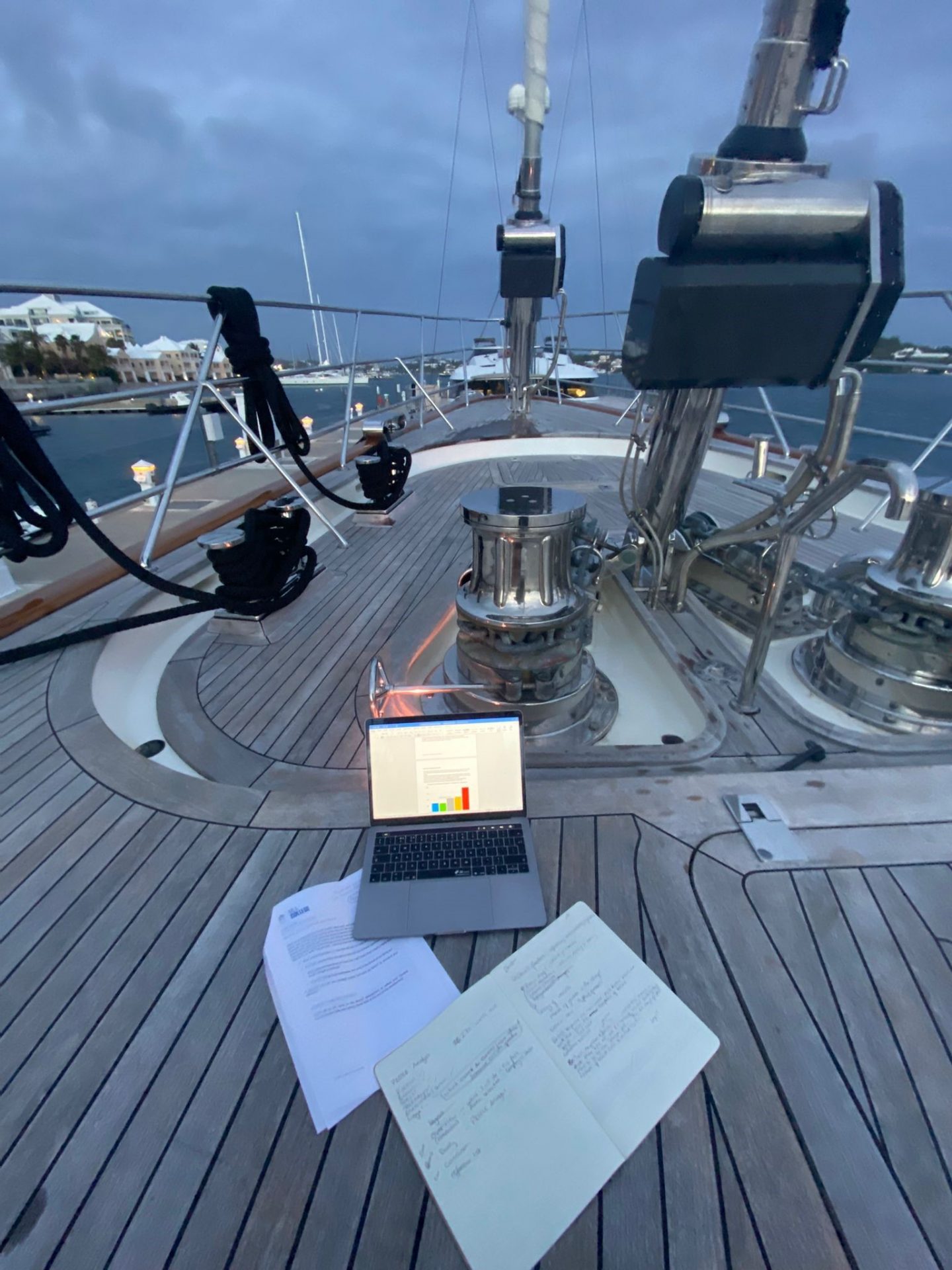
I started a new job in January at the same time as I began my degree and immediately after passing my OOW 3000. To be honest, flying halfway around the world to join the vessel and then straight into a busy season has been tough. Managing my time to put my all into both is a challenge, but I know it’s going to be worth it in the long run. The course is designed for seafarers, and let’s face it – we are inherently busy. Recently, I had to contact my tutor as I knew that I would struggle to submit an assignment due to an extremely busy charter period. I was granted an extension with no problem at all and managed to finish it properly, to the standard I wanted in the extra time given.
So far, I’ve been fortunate and have worked in the sailing fleet since the start of my career. I’ve been working to high standards, whilst experiencing some incredibly varied itineraries, refitting in New Zealand, racing, sailing across the Pacific, rounding Cape Horn, and sailing up the coast of South America – an experience I will struggle to ever forget. I am certainly not afraid of doing some long miles and going off the beaten track. Although I currently have much more to achieve in my career at sea, completing the BSc is important to me in planning for my long-term future and investing in my own personal and professional development.
Poppy: Bosun
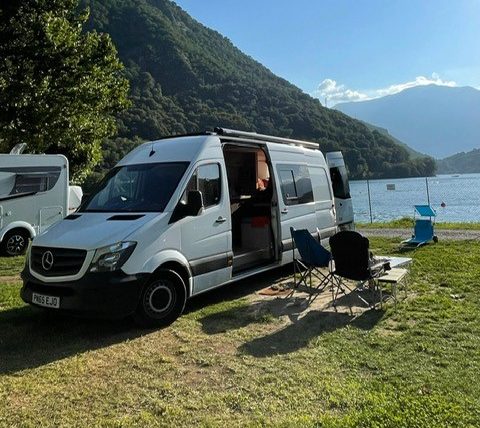
My time at MLA College started in May 2021 after deciding to begin the course when I quit my last seagoing position to have some time out. I aimed to take the summer off and enjoy some time with my partner whilst travelling around Europe in my self-converted van. I started my second module the same week that we left the UK and completed all of the coursework whilst living in the van. It was rewarding having something to focus on whilst I wasn’t working, and it kept my brain ticking throughout this period. Studying in interesting places whilst travelling made the whole process much more enjoyable, and in the end, the two coexisted with one another very successfully. At first, I struggled to manage my time with the coursework – it was very easy to prioritise having fun and enjoying my time off, whilst forgetting about the latest essay. I had to set strict boundaries and expectations for myself; I focused on 1 hour of lectures and 1 hour of extra reading per day. Once I had finished my lectures, I swapped that hour out for writing my assessments. This really helped me feel more in control of the workload. Simple solutions like instead of taking a book to the beach, I would take a journal or report I found online. I also often read when I was a passenger during long drives, you forget you’re actually working towards your coursework, and therefore it becomes a lot more enjoyable.
Throughout the past year, I have been working closely with a mentor, Emma from THE OM, to help me focus on where I want to take my career in the future. At the point of leaving my last position, I knew I wanted to stay in the industry but also knew I needed a break from seagoing positions. This degree helped me keep a foot in the door of the industry, whilst also learning and developing in a sector that I think is becoming ever-more important. At the start of 2022, I started working for a crew agency based in the UK – this worked perfectly alongside my degree and allowed me to have evenings and weekends to complete my coursework. I believe the workload in the coursework is more than manageable whether you are working or not. Nevertheless, it requires pre-planning in order to keep from falling behind. I found I was achieving better grades and feeling more confident as my modules went on, which I think has a lot to do with my personal management of time and priorities. Having completed the MLA College degree, I now have the confidence to start on my OOW modules, and I am looking forward to my next steps back into the industry.
Get in touch
If you are interested in becoming an MLA College student and continuing to learn and the themes of this article resonate with you, Emma Baggett and her company, THE OM, have partnered with MLA College to promote an opportunity for superyacht crew to access a final year BSc or MSc In Sustainable Maritime Operations. This degree is delivered via online distance learning, designed to be accessible and completely flexible around working routines. If you don’t have previous academic qualifications, you can use your CoCs to gain entry. With the opportunity for qualified OOW and Engineer Offices to gain direct entry to a final year BSc and Masters and Chief Engineers to jump straight to an MSc. Whether you want to build on your maritime qualifications or translate your experience and qualifications gained in the sector into a successful career ashore find out more at http://the-om.co.uk/smo
To find out how an MLA College, flexible learning degree can supercharge your degree, click here.










.gif)






